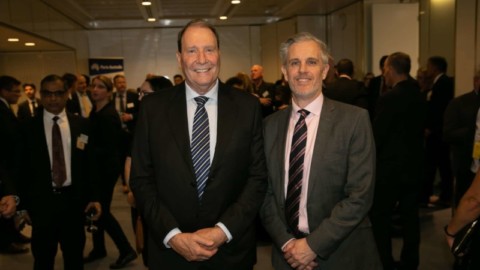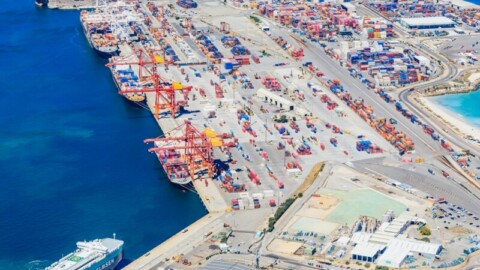The Federal Government has released its 2023-24 Budget, with a major focus on a national infrastructure review, sustainable development and decarbonising the sector.
The budget details the Federal Government’s $7.8 million investment in a Transport and Infrastructure Net Zero Roadmap and Action Plan to support the decarbonisation of the transport and infrastructure sectors.
While the infrastructure budget is considered a placeholder pending the 90-day review of the $120 billion Infrastructure Investment Program (IIP), key details have been released, which include:
- $7.8 million towards a Transport and Infrastructure Net Zero Roadmap and Action Plan
- Additional funding of $200 million to replenish the Major Projects Business Case Fund (MPBCF)
- Funding to establish a National Construction Industry Forum (NCIF)
- $687 million over six years for a national approach to sustainable urban development
- $3.4 billion over ten years to support venue infrastructure for 2032 Brisbane Olympic and Paralympic Games
- $1.8 billion over ten years for infrastructure priorities to support productivity and jobs
- The Heavy Vehicle Road User Charge will be increased, decreasing fuel tax credit expenditure by $1.1 billion over four years
Key pipeline projects
The government’s capped investment in venue infrastructure for the Brisbane Olympic and Paralympic Games includes up to $2.5 billion for the development of Brisbane Arena and up to $935 million towards 16 new or upgraded venues.
A breakdown of the $687 million spend on sustainable urban development includes $305 million for the Macquarie Point Precinct and University of Tasmania Stadium, $211.7 million to establish the Thriving Suburbs Program and $159.7 million to establish the Urban Precincts and Partnerships Program.
The Thriving Suburbs Program is being funded over two years from 2024-25 to provide merit-based and locally driven grants that address shortfalls in priority community infrastructure in urban and suburban communities.
The Urban Precincts and Partnerships Program aims to support investment in urban Australia, based on the principles of unifying urban places, growing economies and serving communities.
This program will fund both the development of precincts through facilitating planning, design and consultation, leading to business cases for investment-ready proposals, as well as a stream to support delivery of larger scale precinct projects.
ACA welcomes funding for NCIF
The Australian Constructors Association (ACA) has welcomed the inclusion of funding in this year’s budget to establish the National Construction Industry Forum (NCIF).
ACA Chief Executive Officer, Jon Davies, said the NCIF will provide a tripartite forum to transform the construction industry, as other sectors have, so that the industry can emerge as a worldwide leader and industry of choice for future generations of workers.
“The NCIF marks a significant step forward for the construction industry, enabling greater collaboration and cooperation amongst industry stakeholders to drive positive change,” Mr Davies said.
“But to address the industry’s challenges, government, industry and unions must leave behind the baggage of history.
“The members of the ACA acknowledge that there is much that they can do to improve the industry without waiting for others.
“At the Future of Construction Summit, the ACA announced a pledge to improve the culture of the construction by embedding flexibility on all member projects, achieving the WGEA Employer of Choice for Gender Equality citation across 75 per cent of members by 2028 and attracting a new wave of talent to sustain the industry.
“The pledge represents just the beginning of our efforts to improve the culture and sustainability of the construction industry, which is crucial for providing the nation with social and economic enabling infrastructure. This commitment complements our active participation in the Construction Industry Culture Taskforce.”
ARA reacts to net-zero plans
The Australasian Railway Association (ARA) has welcomed the Federal Government’s $7.8 million investment in the Transport and Infrastructure Net Zero Roadmap and Action Plan to support the decarbonisation of the transport and infrastructure sectors.
ARA Chief Executive Officer, Caroline Wilkie, said continued investment in sustainable transport systems is critical to achieving net zero targets and will drive the economy and benefit the wider community.
“Rail will be at the heart of emissions reduction strategies for the transport sector and the ARA looks forward to working with the newly formed Net Zero Authority to support the advancement of Australia’s decarbonisation efforts,” Ms Wilkie said.
“We are also pleased to see a focus on developing crucial sustainability skills for the future, as well as helping businesses to engage with net zero transformation opportunities.”
While the forthcoming IIP has created some uncertainty around infrastructure spending, the budget has been commended by both the ARA and industry think tank Infrastructure Partnerships Australia.
“It was important the Government’s independent strategic review of the IIP ensures the $120 billion pipeline over the coming ten years is fit for purpose, delivers certainty for industry and focuses on improving long-term productivity, supply chains and economic growth in our cities and regions,” Ms Wilkie said.
“Having certainty around infrastructure projects ensures a viable and sustainable local rail supply chain which minimises disruptions to contractors and suppliers and enables better workforce planning and capability, and reduces costs.
“I am looking forward to the outcomes of the Government’s independent strategic review and urge the Government to continue its commitment to investing in the rail sector to deliver projects that will support long-term economic and community benefits.”
Infrastructure Partnerships Australia: industry awaits review results
Infrastructure Partnerships Australia Chief Executive, Adrian Dwyer, said that while the Treasurer delivered the budget, it will be 90 days until there is an infrastructure budget.
“It’s pleasing that the budget contained no cuts to transport infrastructure spending, however the sector will be more focused on the release of the independent review in a few months’ time.
“In the context of supply chain issues, labour demand pressures and rising costs, it’s imperative the Federal Government continues to work with industry to provide certainty and clarity while also ensuring that federal taxpayer dollars go to projects that maximise value and productivity,” Mr Dwyer said.
Ports Australia: funding for emission reduction, cyber security, and biosecurity
Ports Australia CEO, Mike Gallacher, has expressed his satisfaction with the budget, stating that the Federal Government’s initial investment is a positive development.
Mr Gallacher said the Australian maritime industry has already been actively working on reducing emissions and that the government will need to consider the efforts already made by ports, shipping lines, and other service providers.
“Sustainable funding of our nation’s biosecurity measures needs to focus on those responsible for sending the potential risk to our shores,” Mr Gallacher said.
“Whether its foreign car manufacturers leaving vehicles sitting idly in paddocks before shipment; overseas based exporters packing a container full of goods to send to Australia or individuals seeking to import into our country products such as meats, fruit, or vegetables.
“They are all seeking to profit from demand in the Australian market and they need to understand we all take the protection of Australian fauna and flora seriously.”
Western Australian Ports Minister, Rita Saffioti, said Western Australia is the engine room of the country’s economy, and the ports play a critical role in ensuring delivery to customers across the world.
“We continue to see increasing demand for many of our exports including iron ore, gas and wheat, which is why we continue to invest in upgrading and expanding infrastructure at our ports,” Ms Saffioti said.
“As the world transitions to renewables – we need to ensure our ports are equipped to export and import key commodities and infrastructure, and our investments over the next four years are focussed on delivering that. This will make sure Western Australia is in a strong position to capitalise from the transition.”
















